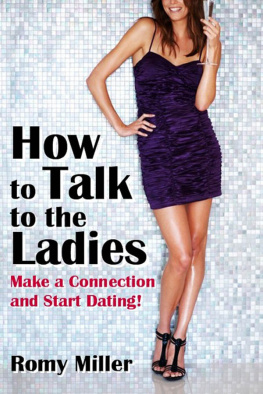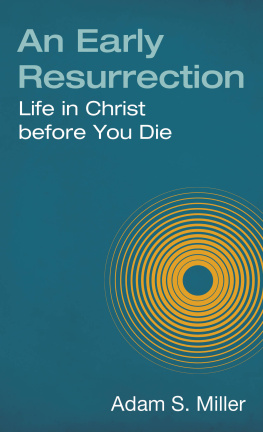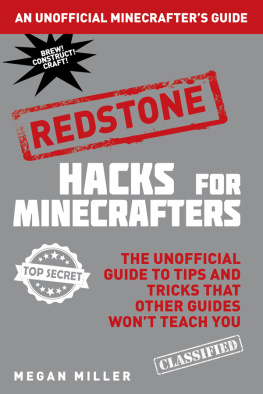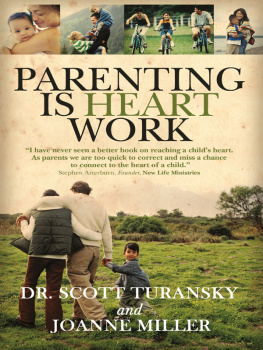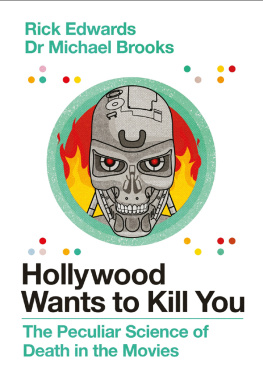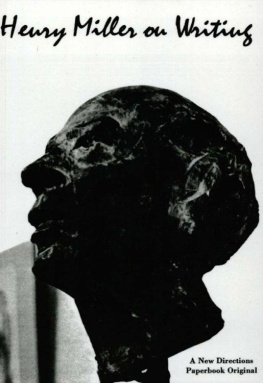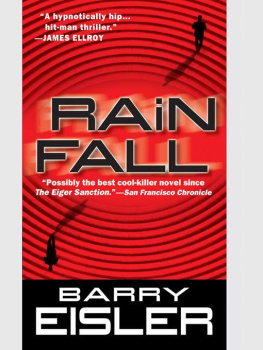Kortes-Miller - Talking About Death Wont Kill You
Here you can read online Kortes-Miller - Talking About Death Wont Kill You full text of the book (entire story) in english for free. Download pdf and epub, get meaning, cover and reviews about this ebook. year: 2018, publisher: ECW Press, genre: Home and family. Description of the work, (preface) as well as reviews are available. Best literature library LitArk.com created for fans of good reading and offers a wide selection of genres:
Romance novel
Science fiction
Adventure
Detective
Science
History
Home and family
Prose
Art
Politics
Computer
Non-fiction
Religion
Business
Children
Humor
Choose a favorite category and find really read worthwhile books. Enjoy immersion in the world of imagination, feel the emotions of the characters or learn something new for yourself, make an fascinating discovery.
- Book:Talking About Death Wont Kill You
- Author:
- Publisher:ECW Press
- Genre:
- Year:2018
- Rating:5 / 5
- Favourites:Add to favourites
- Your mark:
- 100
- 1
- 2
- 3
- 4
- 5
Talking About Death Wont Kill You: summary, description and annotation
We offer to read an annotation, description, summary or preface (depends on what the author of the book "Talking About Death Wont Kill You" wrote himself). If you haven't found the necessary information about the book — write in the comments, we will try to find it.
Talking About Death Wont Kill You — read online for free the complete book (whole text) full work
Below is the text of the book, divided by pages. System saving the place of the last page read, allows you to conveniently read the book "Talking About Death Wont Kill You" online for free, without having to search again every time where you left off. Put a bookmark, and you can go to the page where you finished reading at any time.
Font size:
Interval:
Bookmark:
DR. KATHY KORTES-MILLER

Inquiring Minds Want to Know!
Talking with Children
Posting, Tweeting & Texting:
Dying and Death in a Digital World
For Derrick, who showed us how to live, laugh and love well
And Shirley, who will always love him
There may be no single thing that can teach us more about life than death.
Arianna Huffington
I remember clearly the very first day of my second shot at a Ph.D. program. I sat in a circle with my fellow new students. It felt a bit like kindergarten, but it was exciting nonetheless. There we were, all of us eager to divulge our plans for research and how we hoped to make a difference in the world. One by one, we shared our ideas and passions and talked about what we wanted to study and why. Our peers responded enthusiastically, nodding their heads, asking questions and making suggestions for further reading, other scholars and researchers to explore. It felt like a supportive, collaborative space.
When it was my turn, I leaned forward into this great group of people and said, I want to study death education.
There was silence in the room. Crickets.
Finally, after what felt like an uncomfortably long pause, one of the professors a seemingly kind and gentle soul spoke up. Ahhh, he said. Deaf education. So, you want to work with the hearing-impaired?
Uh, no, not really, I replied, trying to push down a sense of dread and panic. Im thinking death... with a th.
Silence.
As in dying, dead, death, I stammered.
More crickets.
Thats when it occurred to me that maybe were all a bit hard of hearing when it comes to talking about the end of life.
This reception to my research idea was a bit disheartening. Here I was, proposing to focus exhaustively for the next five or more years on a subject that no one wanted to talk about. I might have considered finding a new topic, giving up on death. But I knew I couldnt. Thats because Id already had the experience of being shut down when Id tried to talk about dying. And I was determined not to let it happen again.
The previous year, precisely 12 days before I was to start that same Ph.D. program, I was diagnosed with cancer. I was 37, a mother of two active children, a wife and an educator, and I had a malignant tumour, 10 centimetres long, in my colon. Instead of beginning my studies, I spent a year in treatment, putting on hold not only the Ph.D. but most aspects of my life as I recovered from my surgery and learned how to navigate what they call the new normal.
After I was diagnosed, I was referred to a very well-respected surgeon, considered one of the best in her field in Canada. We met on the day I was supposed to begin my first Ph.D. course. I wanted to tell this surgeon that I was scared. I wanted to tell her I was afraid of dying and leaving my children without their mother. I wanted to tell her what I really should have been doing that day instead and how heartbroken and, frankly, pissed off I was to be in her office rather than at school!
But I didnt get the chance to say any of those things. If youre going to get cancer, this is the kind to get, the surgeon told me matter-of-factly. I was a bit confused: I had just told her that my aunt had died of the same disease when she was only a few years older than I. Still, I managed to get up the guts to say, Im really scared Im going to die, and there are some things I want you to know.
She shut me down. Dont talk like that, she said. You are not going to die.
And, you know, she was right. Thank God, she was right. I havent died yet! I owe that surgeon a debt of gratitude for her role in saving my life. Still, though, I wished then, as I wished throughout my treatment, and as I wish now, that someone one of the multitude of health-care providers I encountered throughout my time as a cancer patient would have talked with me about the death elephant in the room. I could have died. My aunt did. Many others have. Id supported some of them. I needed someone to hear me out, to let me take ownership of my living until I died.
Thats what I want for all of us: to feel like we have a sense of control, to feel heard and to feel safe to talk about dying and death in the midst of our life and living. I want us to have a better death education.
Take a moment to think about your own death education: How have you learned and how do you continue to learn about dying and death? What was your first lesson? Who was your teacher? What was your take-home message? And how does the sum total of your death education thus far serve you today in how you think and talk about dying and death?
If youre shrugging your shoulders and shaking your head in puzzlement (My death education? Who has a death education?) at my questions, youre not alone. Most of us spend more time choosing a new car than we do thinking about the end of life. The vast majority of us have very little in the way of formal (not to mention informal) training or education about what it means to die. I teach an undergraduate course to future health-care providers called Introduction to Palliative Care about how to support people who are dying. Most of the 18- and 19-year-olds who take my course have never experienced the death of someone close to them and have thought very little, if at all, about what death means to them. This isnt unusual: the average health-care professional receives only a few hours of death education over the course of his or her schooling, if they are lucky. If our front-line medical workers, the very people who will most often confront death and dying, have so little in the way of death education, how can they properly and compassionately and productively care for people who are dying? And how can the rest of us, without any formal training, hope to do the same? Let alone think about what we might want for ourselves.
No wonder we struggle with understanding death. Somehow, weve forgotten that we must face the end of our own lives and those of our loved ones. Lets face it: all of us will be intimate with death at least once. Yet we live in a death-denying and death-defying society. We try to pretend death doesnt exist. If someone we love dies, we are granted (or we grant ourselves) only a brief period to grieve, to mourn, and then the expectations of life kick us right back into overdrive. We are expected to get on with things, get over the person we lost in no small part to make things easier for those around us. I returned to working with people who were dying three days after my aunt, with whom I was very close, died.
This approach does not serve us well. It creates a vicious cycle: we neglect our death education (its easy to do when no one ever brings up the topic or offers us a course), so we lack the emotional and practical skills when it comes to facing death. Because we tend to fear what we dont know, we become increasingly scared of talking openly about the end of life. Complicating this is the fact that most of us already fear the process of dying: were scared about pain, loss of control, losing people we love, being ripped from our own lives, uncertainty. That fear can lead to anger as we pretend that dying and death arent integral parts of life and living. We feel isolated as we grapple alone, trying to make sense of our emotions around death. Many of us feel ashamed: of our fears, of our lack of knowledge even of our desire to learn more about the end of life. All these negative emotions can lead to denial; wed rather not experience them, so we work even harder to avoid learning about death. And then, when were faced with death with the cancer diagnosis or the progressive disease or the car accident or the eventual decline of old age we are too overcome with grief, disbelief and denial to think about and plan for it coherently.
Font size:
Interval:
Bookmark:
Similar books «Talking About Death Wont Kill You»
Look at similar books to Talking About Death Wont Kill You. We have selected literature similar in name and meaning in the hope of providing readers with more options to find new, interesting, not yet read works.
Discussion, reviews of the book Talking About Death Wont Kill You and just readers' own opinions. Leave your comments, write what you think about the work, its meaning or the main characters. Specify what exactly you liked and what you didn't like, and why you think so.

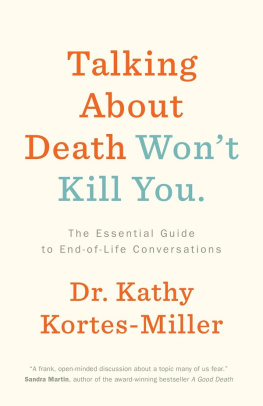
![Kornell Vulrich - Eyes That Watch You [= The Case of the Talking Eyes]](/uploads/posts/book/832907/thumbs/kornell-vulrich-eyes-that-watch-you-the-case.jpg)
